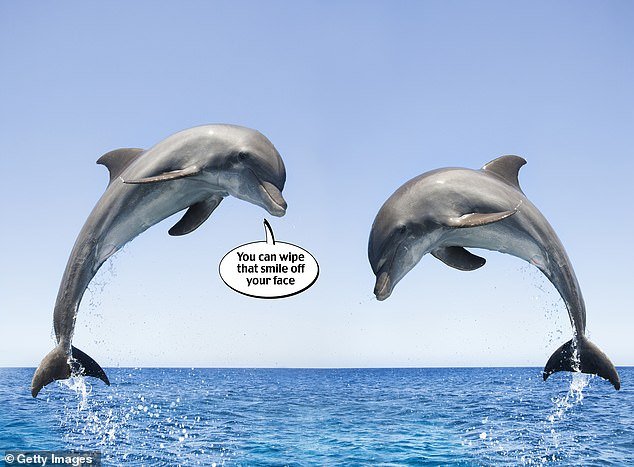Dolphins hold grudges: Male bottlenoses respond strongly to calls of ‘allies’ that have come to their aid in the past – but often ignore those who haven’t helped, researchers find
- Researchers from Bristol University studied the complex ‘alliance network’ among dolphins
- The animals team up to hunt or protect themselves from predators and form social concepts of ‘team membership’
- The study was published in the journal Nature Communications
Dolphins seem to be permanently smiling… but it seems darker emotions may be bubbling under the surface.
After studying ‘alliance networks’ between male bottlenose dolphins living in Shark Bay, Western Australia, marine researchers now reckon the mammals can hold a grudge.
A team from Bristol University found individual dolphins responded strongly to the calls of ‘allies’ that had come to their aid in the past.
But they were more likely to ignore those who hadn’t previously helped – even if they had seemed on friendly terms.
Dolphins seem to be permanently smiling… but it seems darker emotions may be bubbling under the surface. After studying ‘alliance networks’ between male bottlenose dolphins living in Shark Bay, Western Australia, marine researchers now reckon the mammals can hold a grudge
Dolphins team up to hunt or protect themselves from predators and form social concepts of ‘team membership’, the study in Nature Communications argued.
Dr Stephanie King said: ‘Social animals can possess sophisticated ways of classifying relationships with members of the same species.
‘In our own society, we use social knowledge to classify individuals into meaningful groups, like sports teams and political allies.
‘Bottlenose dolphins form the most complex alliances outside humans, and we wanted to know how they classify these relationships.’
The study also found that dolphins co-operate with others that have not helped them directly, but have helped dolphins they know – suggesting the animals remember who is and isn’t likely to assist them.
The animals, the study highlights, work together for a number of reasons including teaming up to attack or protect themselves from opposing groups.
![Dolphins are able to identify each other's calls because they develop signature whistles which stay they same throughout their life [Stock image]](https://i.dailymail.co.uk/1s/2021/04/23/01/39497098-9502259-New_research_from_the_University_of_Hull_has_found_dolphins_to_b-a-187_1619137291427.jpg)
Dolphins are able to identify each other’s calls because they develop signature whistles which stay they same throughout their life [Stock image]
Dolphins are able to identify each other’s calls because they develop signature whistles which stay they same throughout their life.
While dolphins pick and choose close alliances for short term goals, they draw on a larger group of contacts to build these working teams.
Sometimes these secondary groups also draw on each other for support – forming an even larger network.
What this shows, the researchers said, is that these dolphins form social concepts of ‘team membership’ – categorising allies according to a shared history of co-operation.
Dr King said: ‘Such concepts develop through experience and likely played a role in the co-operative behaviour of early humans.
‘Our results show that cooperation-based concepts are not unique to humans, but also occur in other animal societies with extensive co-operation between non-kin.’
